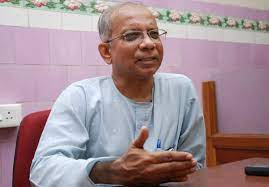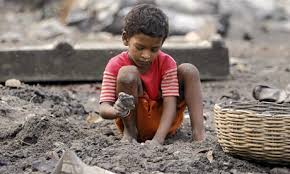Human Rights Campaigner, writer and commentator, Peace and Reconciliation Activist, and above all, a Catholic priest, Fr. Cedric Prakash SJ reminisces on the occasion of the 500th Anniversary of St. Ignatius’ Cannonball moment!
Bombay Boy goes tripping
A thirteen- fourteen-year-old has many dreams! That’ s an impressionable age; at the cusp of finishing school. It is also a time when one tastes a different kind of ‘freedom’: to go for camps with boys of your own age (not with one’s family). Such camps and outings were always enjoyed to the hilt. The ones however, which still remain etched in my memory are the ‘mission camps’ to the Jesuit missions in Maharashtra and Gujarat.
Being a ‘Bombay Boy’, a trip to the rural areas was a very special experience: the silence and simplicity of the villages were a marked difference from the hustle and bustle of a big city; on the other hand, the warmth and hospitality of the locals despite their abject poverty always meant much. Then there were the Jesuits (several Spaniards among them) who had given up every comfort which could have been theirs, to live a life identifying with the local people: sharing their joys and sorrows, building bridges, educating them to a more dignified and equitable life.
Can’t help looking back and say that today, I am happy and humbled to be a Jesuit!
College Years
Then there were the College years: it was a joy and pride to be a Xavierite, particularly as it entered its Centenary Year. St. Xavier’s College, Bombay has always been special, most alumni will vouch for that! Four memorable years: the classroom was just one arena for education but there were many more: a whole range of co-curricular activities that helped one to grow. Then there were the Jesuits of the college – all stalwarts in their own right. In the College Social Service League – one was provided with ample opportunity to reach out to the slum-dwellers in Dharavi or the Adivasis of Talasari.
There was the influx of refugees into West Bengal in the wake of the war of liberation in East Pakistan and of course, the Xavierites went all the way to Salt Lake City to serve the displaced. I will never forget that Spanish Jesuit who after tough class hours would go to be with the street urchins in VT or Churchgate or Bombay Central Railway Stations-, encouraging some of them to find some security and safety in the ‘Snehasadan’ Home in Andheri. These were great human beings – who transcended narrow confines, that is why I am happy and humbled to be a Jesuit!
The years in the AICUF (All India Catholic University Federation) were also special: first as a member and then for a year as a full-timer in Madras. AICUF, a student movement has shaped several National leaders – both women and men committed to the task of nation-building and serving the poor and underprivileged, the exploited and the excluded of the country.
The intellectual, spiritual and social formation one received in the AICUF was tremendous. The Directors, Advisers, Chaplains at that time, were mostly Jesuits: they mentored and guided, challenged and guided the young students who looked up to them.
Watershed moments
Those were the years when we had the watershed moments: first in Poonamallee and then in Goa. In both places as youth, we had the hunger and thirst to see a new India. Our basic pledge was “We were born in an unjust society and we are determined not to leave it as we have found it” We launched ‘Project Know India’ encouraging youth like us, to spend at least a year among the less privileged in the villages and slums of India. Some did so; it was a transformative experience for them.
All thanks to the vision and the commitment of the Jesuits; that is why I say without hesitation that I am happy and humbled to be a Jesuit!
The defining programmes at that time were the ones on social awareness. These opened our eyes and hearts to what was happening around us. We had opportunities to do social analysis: to see and understand in an objective and studied manner the painful realities that gripped so many in society. Many questions: why are only some children able to access quality education? Why are there so many child labourers in the country? Why do the poor, become poorer and the rich, richer? Why are there no adequate health care facilities in the remote tribal areas? Why do people have to leave their villages to eke out an existence in the cities? Why are the Adivasis deprived of their natural habitat: jal, jungle aur jameen? Who profits from their impoverishment? Above all, what would Jesus do if he were around today?
Such questions and many more relevant ones, challenged us: made us look at our own lives in comparison to the vast majority. Deprivation and injustice were their lot; we had to conscientize ourselves and others to be the change we want to see. Many of these programmes were conducted at the Jesuit Indian Social Institute in Bangalore.
The ability ‘to see’ things differently and to have the motivation to do something about it were certainly because of the Jesuits and that is why I am happy and humbled to be a Jesuit!
Second Vatican Council Vibes
From the early sixties, the Church has been responding in a contextual and meaningful way to the women and men of our times. The Second Vatican Council had a fundamental question what does it mean to be the Church of God in the modern world?” The path-breaking Pastoral Constitution on the Church in the modern world ‘Gaudium et Spes’, was an apt response to what St. Pope John XXIII envisaged as the sum and substance of a historic intervention.
Earlier, in his Encyclical ‘Pacem in Terris’ he underlined the inviolability of human rights and the four non-negotiables of Truth, Justice,Charity and Liberty,which are prerequisites for sustainable peace; with that profound statement “There is a saying of St. Augustine which has particular relevance in this context: “Take away justice, and what are kingdoms but mighty bands of robbers.” Fifty years ago in 1971, the Synod of Bishops declared, “even though it is not for us to elaborate a very profound analysis of the situation of the world, we have nevertheless been able to perceive the serious injustices which are building around the world of men a network of domination, oppression and abuses which stifle freedom and which keep the greater part of humanity from sharing in the building up of a more just and more fraternal world.”
I entered the Society of Jesus in 1974, just before the pathbreaking 32nd General Congregation of the Jesuits which unequivocally stated that “the mission of the Society of Jesus today is the service of faith, of which the promotion of justice is an absolute requirement. For reconciliation with God demands the reconciliation of people with one another”; that is why I am happy and humbled to be a Jesuit!
Ignatian Journey
Since the earliest days of my formation, in keeping with the faith-justice mandate of the Jesuits, and together with my companions, I was exposed to the grim realities which ordinary people experience all the time.
These included being with displaced slumdwellers and helping in their rehabilitation in the construction of low-cost houses; manual work in watershed programmes in the Adivasi heartland; working as an ordinary labourer with Adivasis, in the preliminary work on the Narmada Dam (the Adivasis were exploited by powerful contractors and given a pittance for their hard work).
Such engagements continued all through my life as a Jesuit, because the person and message of Jesus, the teachings of the Church and the directives of the Jesuits were clear and unambiguous: to take sides with the poor and the oppressed, the marginalised and the minorities, the excluded and the exploited, all who are vulnerable and suffering. It has always been a stand for human rights, justice, reconciliation and peace; a stand for the values enshrined in our Constitution and the democratic rights of every single citizen.
It has certainly meant being on the wrong side of the powerful, vested interests, of the lustful lobbies (sometimes even those whom you regard as ‘friends’) who have no qualms of conscience of keeping the poor impoverished, even as they amass huge fortunes. It has meant taking on those who have kept people divided in the name of religion, through divisive policies, hate speeches and nefarious communal misdeeds.
It has meant standing up to those who want to destroy the sacred pluralistic fabric of the country and sell the nation for their own profiteering. The journey has not been easy -but I am happy and humbled to be a Jesuit!
Film Studies
In 1986, The Mission, a powerful British drama film was released. The film is about the experiences of a Jesuit missionary in 18th-century South America. It is about the stand which the Spanish Jesuits take to protect the identity of a remote South American tribe (the Guarani Indian people, an indigenous people of the Amazon). It is intertwined in the political pressures of a colonial power, the predatory racism of European settlers who are basically pro-slavery and the pragmatic needs of the Jesuits (and Church) of that time.
The Mission is based on historical facts surrounding the 1750 Treaty of Madrid in which Spain ceded part of its territories in Paraguay to Portugal, mainly the areas where the Jesuits had their missions. There is an important subtext to the movie: the impending suppression of the Society of Jesus in most parts of Western Europe (beginning in 1759, formalised in 1773 and which ended only in 1814).
The film portrays the resilience of the Guarani people despite all odds and the efforts of the Jesuits to accompany them in order to protect their rights, their customs and above all from being swallowed in the lucrative slave-market of that time. The film deals with bureaucratic hassles, political and religious machinations, intrigue, greed for power and profits among other human frailties; however, at the same time it also focuses on the challenges and hostilities that one must face when one attempts to take on the system, the powers (vested interests). Above all, it is a film about “mission”, what it entails when disciples of Jesus actually demonstrate that unflinching prophetic courage to go forth to the peripheries.
The film truly makes me happy and humbled to be a Jesuit!
Cannonball moments
It is an Ignatian Year: the 500th anniversary of the conversion of St Ignatius following the painful event when his legs were shattered by a cannonball on 20 May 152, as he defended the citadel of Pamplona from the French.
Announcing the Ignatian Year, the Jesuit Superior General Fr Arturo Sosa writes, “the Universal Apostolic Preferences (2019-2029) have confirmed the call to our personal, community and institutional conversion, which is necessary for our greater spiritual and apostolic freedom and adaptability. Let us take this opportunity to let God transform our life-mission according to his will”.
He adds “the Ignatian year 2021-2022 will therefore be for us a privileged occasion to hear the cry of the poor, the excluded, and those whose dignity has not been respected, in all the diverse social and cultural circumstances in which we live and work. It is a listening which moves our hearts and compels us to draw closer to the poor, to walk with them in seeking justice and reconciliation”. Reason enough for me to be happy and humbled to be a Jesuit today
When a shoddy article written by a so-called ‘alumnus’, replete with falsehood and half-truths, divisive and manipulative in nature, is brought to my notice, I really do not wonder!
In an India, where ‘godified’ media rules the roost, where crony capitalists spinelessly toe the line of a fascist regime, where justice and truth are conveniently sacrificed at the altar of injustice and ‘feku-isms’, where the poor are at the receiving end of a rotten and inhuman system – such trash is on expected lines. Labelling a Jesuit, a Marxist??? Marx must be smirking! Almost like saying that if you use a plane, you become American or if you sit in a train in India, you becoming a British!
Fr Stan Swamy gave his life for the Adivasis in their struggle for a more humane, just and dignified life; denigrating in any way, this Prophet and Martyr, is just pathetic -the handiwork of someone who is unable to digest the plain truth! Above all, playing one against the other of the same family is an age-old trick. (“Father, you were so nice, not like the Jesuits of today!”).
Jesuits do not easily fall prey to such gimmicks; inspite of differences, we know there is a strong bond among us: a union of hearts and minds based on the vision of Ignatius of Loyola and entrusted with a mission today!
We also have a Jesuit in Pope Francis who in his Encyclical ‘Fratelli Tutti’ emphasises that, “the Church is a home with open doors, because she is a mother. And in imitation of Mary, the mother of Jesus, we want to be a Church that serves, that leaves home and goes forth from its places of worship, goes forth from its sacristies, in order to accompany life, to sustain hope, to be the sign of unity… to build bridges, to break down walls, to sow seeds of reconciliation.” Need we say more?
As we celebrate St Ignatius Loyola: the fire that lit other fires- I say from the very depth of my being, that: I am really happy and humbled to be a Jesuit!





